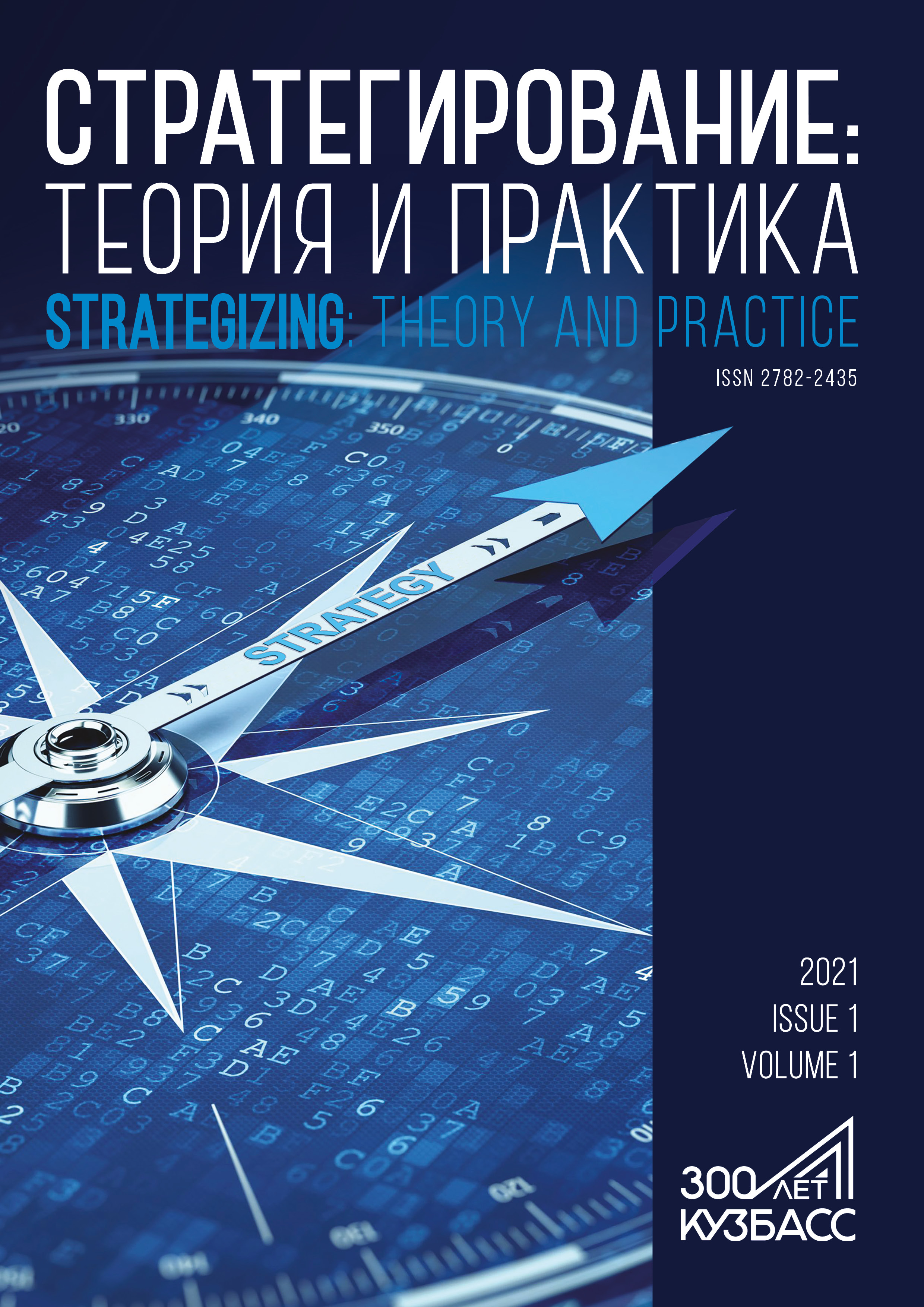Moscow, Russian Federation
Russian enterprises need technological independence and new strategies for non-standard solutions in such spheres as import substitution, novel production processes, effective management of complex engineering facilities, high labor productivity, etc. This research featured the digital transformation of an economic entity, which was chosen based on a list of seven principles that determined the importance of the enterprise for the national economy. The author used the method of OTSW analysis developed by Professor V.L. Kvint to determine the strategic priorities for the digital development of the Russian Television and Radiobroadcasting Network (RTRN). The initial data were obtained from its employees via a questionnaire. The questionnaire consisted of 37 questions divided into functional groups. It served as an aggregator of information about the current state of the enterprise and its readiness for digital transformations. The RTRN was evaluated as an “exemplary enterprise”; however, its digitalization level did not reach that of a “smart enterprise”. The survey made it possible to define the strategic priorities for the prospective digital transformation, as well as to describe the concept of digital development. The author also calculated the economic effect from the practical implementation of priority digital development measures. The resulting digital development strategy can be applied to digital transformation projects in other sectors of the national economy.
innovations, strategizing, strategic priorities, technologies, digital maturity, digital enterprise, digital transformation, efficiency
1. Babanova UV, Orlov VM, Antonyan RS. Flexible technologies of enterprise management in conditions of digitalization of economy. Izvestia Volgograd State Technical University. 2018;216(6):61-66. (In Russ.)
2. Baranovskiy BYu, Zaychenko IM. Formation of the strategic map of business management on the basis of the concept of digital transformation of business. St. Petersburg State Polytechnical University Journal. Economics. 2018;11(3):185-193. (In Russ.) https://doi.org/10.18721/JE.11316
3. Bodrunov SD. Reindustrialization in the conditions of new technological revolution: Road to the future. The Manager. 2019;10(5):2-8. https://doi.org/10.29141/2218-5003-2019-10-5-1
4. Galimova MP. Readiness of Russian enterprises to digital transformation: organizational drivers and barriers. Bulletin USPTU. Science, Education, Economy. Series Economy. 2019;27(1):27-37. (In Russ.) https://doi.org/10.17122/2541-8904-2019-1-27-27-37
5. Dolganova OI, Deeva EA. Company readiness for digital transformations: Problems and diagnosis. Business Informatics. 2019;13(2):59-72. (In Russ.) https://doi.org/10.17323/1998-0663.2019.2.59.72
6. Efanov VA. Development of approaches to assess enterprise readiness for digital transformation. Economic Analysis: Theory and Practice. 2022;21(9):1687-1704. (In Russ.) https://doi.org/10.24891/ea.21.9.1687
7. Isaev EA, Korovkina NL, Tabakova MS. Evaluation of the readiness of a company’s it department for digital business transformation. Business Informatics. 2018;44(2):55-64. (In Russ.)
8. Kvint VL. Kontseptsiya strategirovaniya. T. 1 [The concept of strategizing. Vol. 1.]. St. Petersburg: SZIU RANKhiGS; 2019. 132 p. (In Russ.)
9. Mayorova KS, Balashova ES. Digital transition of industrial enterprises into the “smart” ecosystem. Russian Journal of Industrial Economics. 2021;14(4):433-444. (In Russ.) https://doi.org/10.17073/2072-1633-2021-4-433-444
10. Orlov AI. Organizatsionno-ehkonomicheskoe modelirovanie. Ch. 2: Ehkspertnye otsenki [Organizational and economic modeling. Part 2: Expert assessments]. Moscow: Bauman Moscow State Technical University; 2011. 486 p. (In Russ.)
11. Pinchuk VN, Zhuravlev DM. Predpriyatie. Tekhnologii i ehkonomika tsifrovoy transformatsii [Company. Technologies and economics of digital transformation]. Novosibirsk: Akademizdat; 2020. 216 p. (In Russ.)
12. Popov IV, Kiseleva MM, Iakovleva EA. Digital business management models. UEHPS: Upravlenie, ehkonomika, politika, sotsiologiya [Management, Economics, Politics, Sociology]. 2019;(3):58-64. (In Russ.) https://doi.org/10.24411/2412-2025-2019-00042
13. Purlik VM. Intellectual capital as a key factor of companies’ development in the knowledge economy. RISK: Resources, Information, Supply, Competition. 2018;(1):92-95. (In Russ.)
14. Babkin AV, Burkaltseva DD, Kosten DG, Vorobyov YuN. Formation of digital economy in Russia: Essence, features, technical normalization, development problems. St. Petersburg State Polytechnical University Journal. Economics. 2017;10(3):9-25. (In Russ.) https://doi.org/10.18721/JE.10301
15. Ananyin VI, Zimin KV, Lugachev MI, Gimranov RD, Skripkin KG. Digital organization: transformation into the new reality. Business Informatics. 2018;44(2):45-54. (In Russ.)
16. Malyshev EA, Mikryukova MYu, Romanov VA, Khubulova VV. Digital technology in the context of the production infrastructure management of the enterprise. Transbaikal State University Journal. 2019;25(5):114-112. (In Russ.)
17. Chaadaev VK. Protsessnyy podkhod k upravleniyu predpriyatiyami svyazi [Process approach to management of communication enterprises]. St. Petersburg State Polytechnical University Journal. Economics. 2007;2(3):99-106. (In Russ.)
18. Obwegeser N, Yokoi T, Wade M, Voskes T. 7 Key Principles to Govern Digital Initiatives. MIT Sloan Management Review. 2020;61(3):1-9.
19. Hazra TK, Unhelkar B. Enterprise architecture for digital business: Integrated transformation strategies 1st Edition. Boca Raton: Auerbach Publications; 2020. 282 p.





